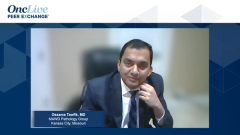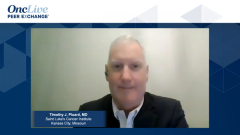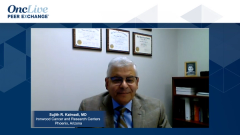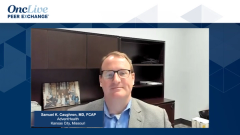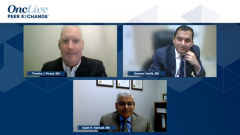
Role of a Pharmacist in the Multidisciplinary Approach to Identifying Biomarkers
Expert perspectives on the role of an oncologic pharmacist within a tumor board and how they can improve upon precision medicine in cancer management.
Episodes in this series

Transcript:
Timothy J. Pluard, MD:We have engaged our oncology pharmacists who have become very interested in this molecular oncology approach. So, they are copied and review all our next- generation sequencing that comes from outside. They’re present and often lead the discussion of molecular tumor boars. They will notify clinicians about actionable results, which I think has been a fortuitous development only because we have the pharmacists who are very interested in it. Though, I think this is one potential avenue to try to ensure the information is identified and utilized.
Ryan Haumschild, PharmD, MS, MBA: Pharmacists play such an important role in personalized medicine. We're part of the care team, not only on treatment selection but in monitoring and determining subsequent treatments. So, there's a variety of different pharmacists that exist. There's some that are residency trained and board-certified in oncology that practice in the clinic directly with the team. There are also pharmacists that play an important role in the infusion center, in the in-patient hospital, or the specialty pharmacy.
Everyone is always trying to determine what is the best therapeutic approach for every patient. A lot of times that involves making sure that providers are doing the necessary screening on the front-end through an appropriate precision medicine panel, so we can identify the best treatment for that patient early on in therapy, and also reassess therapy subsequently in later lines. Pharmacists are uniquely positioned to provide those recommendations, bring forward that research, and also educate their colleagues and patients on the importance of personalized medicine.
Pharmacists, I found, are playing more and more of a role in patient care around personalized medicine. A lot of times, as new therapies come to the market, it's the pharmacist that really understands the therapeutic intervention, but also the necessary genomic screening that needs to occur before we can start a patient on treatment. Pharmacists are also extremely involved in developing order sets and clinical pathways to make sure that, based on first-line therapy or reflex, that we're providing the right targets to be evaluated based on the unique disease state.
We know there's several targets, whether it's going to be lung cancer or looking at small molecules such as EGFR, ROS1, and ALK. Also looking at checkpoint inhibitors and seeing what the PD-L1 expression looks like in a unique patient is important. We know, based on that information, we can give a recommendation to the provider team on what therapy should be selected or potentially what therapy should be avoided based on the unique expression of the disease state.
So, identifying what important precision medicine tests need to be ordered on the front-end is one of the pharmacists’ roles. Though, we know once that's done, we actually have to see the results and figure out how we incorporate them into the electronic medical record. Many precision medicine companies, whether it be internal or external, provide their results sometimes in a PDF format. So, pharmacists play an important role by reviewing those reports, bringing those recommendations, and working up patients in clinic prior to treatment. They can also make sure that the medication that's ordered matches the precision medicine results that we're looking for.
Lastly, if a patient was initiated on therapy outside of the organization and they get referred in, are we making sure to reassess and look through those external documents to make sure that we're providing the most appropriate treatment for the precision medicine marker? So, that's really where pharmacists come into play. They're going to provide that information to the provider team. They're going to make sure that you have a drug and genomic panel match. Lastly, they're going to make sure that all that information is carried forward and not lost during the treatment continuum.
I think educating patients is becoming so important. We've always thought it was important, but especially around precision medicine. Patients need to understand why we are selecting certain therapies, and why they are getting these expensive test results early on in their treatment.
Pharmacists are uniquely positioned to spend that time with a patient where they can talk through some of these precision medicine or genomic targets, but also talk about the unique treatments that are available to them. We want to educate patients on the importance of personalized medicine. When you're talking about medicine, there's no one more credentialed to have that conversation than a pharmacist that's been trained in that specific therapeutic area. So, when they can talk through the patient journey, or the treatment journey with that patient, make sure that they have clear expectations on what to expect, and if there's going to be any reflex panels required as part of their treatment. This provides the patient with clarity and understanding of the shared goals within the provider team and, ultimately, it will allow them to be more successful in therapy as well as more compliant, and more engaged, in their treatment plan.
Personalized medicine continues to emerge, and I think that's really exciting. We also know, with our payer colleagues who manage care, sometimes there can be barriers, specifically around financial toxicity, but even the prior authorization and approvals of these genomic panels. So, pharmacists are uniquely positioned, again, to review the therapeutic options available for a patient. If there is a panel that needs to be ordered, and we get a denial, pharmacists can do a really great job of reviewing the data that's available and leveraging data that exists such as a phase 2 trial. Also, leveraging investigator-initiated research for a patient that might be using a panel, which might be an emerging biomarker that may not necessarily be the standard of care currently, is important. Pharmacists also are very helpful in approaching those prior authorizations and helping draft appeal letters utilizing scientific information that's specific to that patient and that disease to gain approval. Lastly, we work with external organizations to reduce the financial toxicity, not just for the medication, but also for the precision medicine panel so that we can be screening these patients earlier and reduce any additional cost of care.
Transcript edited for clarity.


